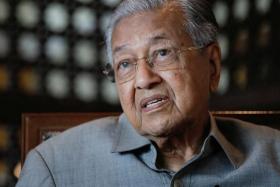Asian Games: Malaysia refuses to give back ‘doping’ gold
Malaysia has refused to hand back the Asian Games gold medal won by a wushu athlete who failed a doping test.
The country's wushu champion Tai Cheau Xuen was expelled from the Games on Tuesday after she was found to have taken the stimulant sibutramine, which is used in widely available dietary supplements.
Tai, who bagged the country's first gold medal on Sept 20, has returned to her home country.
Malaysia officials said on Wednesday they still have the gold and they are not about to hand it over.
'Why do we need to give back the gold medal?'
The country's head of mission Danyal Balagopal told The Star that it had taken about 16 hours to get the results of Tai’s test back.
"We usually know the result as soon as it is brought to the lab," he said.
"On the day when the urine was taken from Tai, there were five samples placed together. There is a possibility that it was accidentally switched. Why do we need to give back the gold medal?" he added.
On Wednesday, Malaysia made a formal appeal to the international sports court over the way her drug test was handled, Olympic Council of Asia (OCA) officials said.
The Swiss-based independent Court of Arbitration in Sport (CAS) has set up a special unit in Incheon to handle disputes at the Games.
Zero tolerance for drug use
OCA director general Husain al-Musallam said: "The CAS will make its decision on whether or not to restore the gold within 24 hours.
"If the court finds that this player has the right to get back the medal, the OCA will not oppose it."
Malaysia’s Olympic chief Sieh Kok Chi said random doping tests had been carried out before the Asian Games on Malaysian athletes, with the exception of the wushu team.
"It is sad that a Malaysian gold medal winner has tested positive," he said, adding that Malaysia has zero tolerance for drug use.
'Tai did nothing wrong'
Tai, who turns 23 on Thursday, has garnered widespread sympathy in her homeland.
National Sports Institute director-general Ramlan Aziz said: "I am convinced Tai did nothing wrong. She strongly denied knowingly taking any illegal drugs or substances."
Tai’s 55-year-old father said she "will not consume performance enhancing drugs to boost her prospects of winning".
So far, five athletes have been snared in the hunt for banned drugs at the event.
The OCA says that about 1,900 of the 9,500 athletes in Incheon will be tested during the Games, which close on Saturday.
Source: AFP
Get The New Paper on your phone with the free TNP app. Download from the Apple App Store or Google Play Store now


